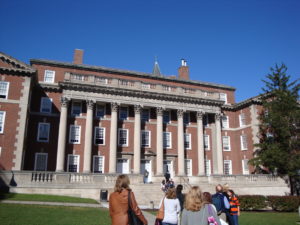Written in collaboration with Sandy Furth, World Student Support
For students and parents, visiting universities can be a daunting task. However, it does not have to be. With a bit of planning and an understanding of the purpose of a college tour, a campus visit can be a great experience. The key is knowing what to do before, during, and after your visit.
Keep in mind that colleges are on a tight timeline when it comes to information sessions and tours for prospective students and their parents. An admissions counselor often introduces the school during a presentation, sometimes showing a video or PowerPoint to highlight different aspects of the college. The admissions counselor likely will talk about the college’s history, it’s top-notch programs, the admissions process, and scholarships/financial aid. Hopefully, there will be time at the end of the presentation for questions.
Then, the admissions counselor will introduce the student tour guides, often called student ambassadors, who will show students and parents around the campus, pointing out different buildings and explaining what goes on in each. Often, these ambassadors will discuss their own experiences at the school as well. These tours are timed, and prospective students on the tour might have appointments with admissions officers, and guides often have class after the tour ends, so staying on task for these tours is important.
Parents, it is crucial to remember that even though you likely will be involved in your student’s decision of where to go to college, your student is the one who will actually be attending college. Therefore, he or she should take the lead when visiting college campuses. Below is a list of tips intended to help parents help their teens in making the most of college visits.
Assist with logistics, i.e. travel plans (booking flights, figuring out driving times), transportation between campuses (rental cars, rental car, public transportation, taxi, Uber, Lyft), hotel reservations, etc. If visiting more than one campus in a single day, be sure to allow for enough time between campuses so you are not rushing from one campus to the next. Most colleges require students to sign up for tours in advance, and this can usually be done on the school’s website, but it is something your teen can and should do.
Before the tour, have your student look at the school’s website, and if they have printed materials from the school, they should review those as well. Students should mark what they think looks great and come up with some questions to ask during their visit. You can help your teen figure out what to ask and identify the best person for each question, i.e. an admissions officer, a student tour guide, someone if financial aid, etc.
Take photos of the campus so you can remember what you and your teen saw. Ideally, the first photo you take will be of something with the college’s name on it (i.e., a sign or brochure), so if you are visiting multiple schools, you will know which photos were from which colleges.
While touring, stand in the back of the crowd, allowing students to stand up front and close to the student ambassador. Remember that students are the ones who need to see and hear with acuity. However, listen for the kinds of information your son or daughter might not be paying attention to, such as who teaches courses (TAs or professors), the quality of relationships between professors and students, academic advising and support services, etc.
Leave most of the questioning to the students. Remember, the point of the tour is for students to take in the atmosphere of the school. Don’t fret if your teen is not asking questions. Rest assured, your son or daughter is in observation mode. Just don’t be “that parent” who dominates. If you do have questions, keep in mind that your student guide may not know specific information, such as what research opportunities are available for biology majors (unless the guide is a biology major) or the details of the financial aid process. Those questions are better directed to the appropriate adult — i.e., a biology professor or the financial aid office.
Take notes on important points, but don’t let note-taking dominate the tour. You also want to observe what is happening around the campus, particularly if you are able to visit during the school year.
After the tour, ask your teen:
- What did you like most and least? Why?
- What did you find surprising or interesting?
- How was this school different from other schools you have visited?
- Can you see yourself on this campus? Do you think you would be happy academically, extracurricularly, socially?
Encourage your student to write down their answers and reflect on their time on campus. You can write down your reflections as well. The more schools you visit, the more your and your teen’s memories will blur together, so it helps to have notes to come back to and review.
Parents should remain non-judgmental. It is your teen who is going to college, and he or she is the one who needs to be comfortable at the campus of choice. College is the first step in one’s adult life, but certainly not the last.
For more on making the most of a college visit, including tips for students, see this blog post.





